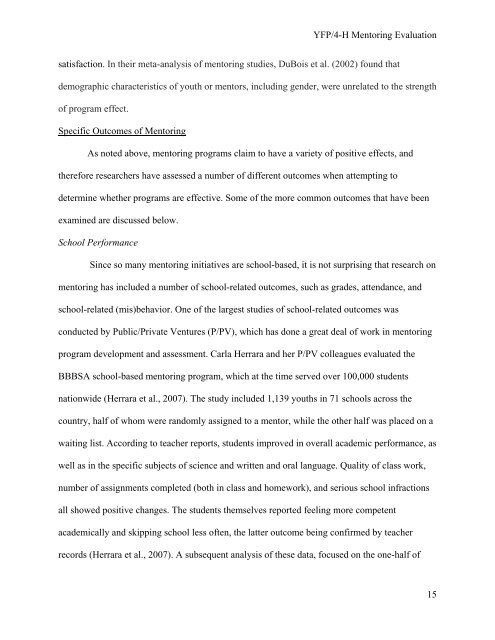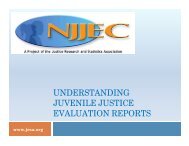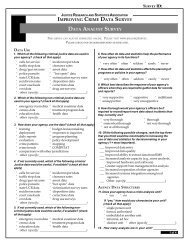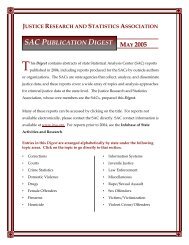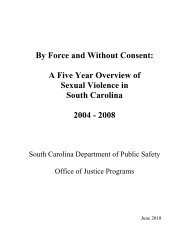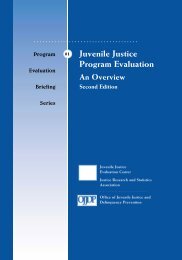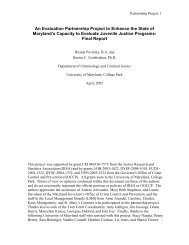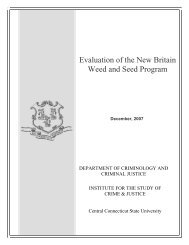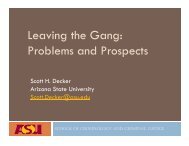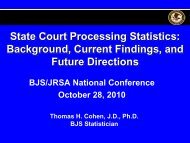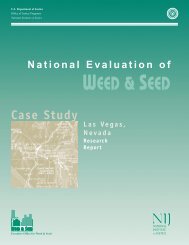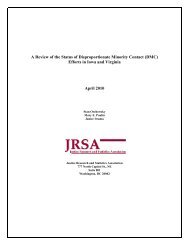A Process and Outcome Evaluation of the 4-H Mentoring/ Youth and ...
A Process and Outcome Evaluation of the 4-H Mentoring/ Youth and ...
A Process and Outcome Evaluation of the 4-H Mentoring/ Youth and ...
You also want an ePaper? Increase the reach of your titles
YUMPU automatically turns print PDFs into web optimized ePapers that Google loves.
YFP/4-H <strong>Mentoring</strong> <strong>Evaluation</strong><br />
satisfaction. In <strong>the</strong>ir meta-analysis <strong>of</strong> mentoring studies, DuBois et al. (2002) found that<br />
demographic characteristics <strong>of</strong> youth or mentors, including gender, were unrelated to <strong>the</strong> strength<br />
<strong>of</strong> program effect.<br />
Specific <strong>Outcome</strong>s <strong>of</strong> <strong>Mentoring</strong><br />
As noted above, mentoring programs claim to have a variety <strong>of</strong> positive effects, <strong>and</strong><br />
<strong>the</strong>refore researchers have assessed a number <strong>of</strong> different outcomes when attempting to<br />
determine whe<strong>the</strong>r programs are effective. Some <strong>of</strong> <strong>the</strong> more common outcomes that have been<br />
examined are discussed below.<br />
School Performance<br />
Since so many mentoring initiatives are school-based, it is not surprising that research on<br />
mentoring has included a number <strong>of</strong> school-related outcomes, such as grades, attendance, <strong>and</strong><br />
school-related (mis)behavior. One <strong>of</strong> <strong>the</strong> largest studies <strong>of</strong> school-related outcomes was<br />
conducted by Public/Private Ventures (P/PV), which has done a great deal <strong>of</strong> work in mentoring<br />
program development <strong>and</strong> assessment. Carla Herrara <strong>and</strong> her P/PV colleagues evaluated <strong>the</strong><br />
BBBSA school-based mentoring program, which at <strong>the</strong> time served over 100,000 students<br />
nationwide (Herrara et al., 2007). The study included 1,139 youths in 71 schools across <strong>the</strong><br />
country, half <strong>of</strong> whom were r<strong>and</strong>omly assigned to a mentor, while <strong>the</strong> o<strong>the</strong>r half was placed on a<br />
waiting list. According to teacher reports, students improved in overall academic performance, as<br />
well as in <strong>the</strong> specific subjects <strong>of</strong> science <strong>and</strong> written <strong>and</strong> oral language. Quality <strong>of</strong> class work,<br />
number <strong>of</strong> assignments completed (both in class <strong>and</strong> homework), <strong>and</strong> serious school infractions<br />
all showed positive changes. The students <strong>the</strong>mselves reported feeling more competent<br />
academically <strong>and</strong> skipping school less <strong>of</strong>ten, <strong>the</strong> latter outcome being confirmed by teacher<br />
records (Herrara et al., 2007). A subsequent analysis <strong>of</strong> <strong>the</strong>se data, focused on <strong>the</strong> one-half <strong>of</strong><br />
15


